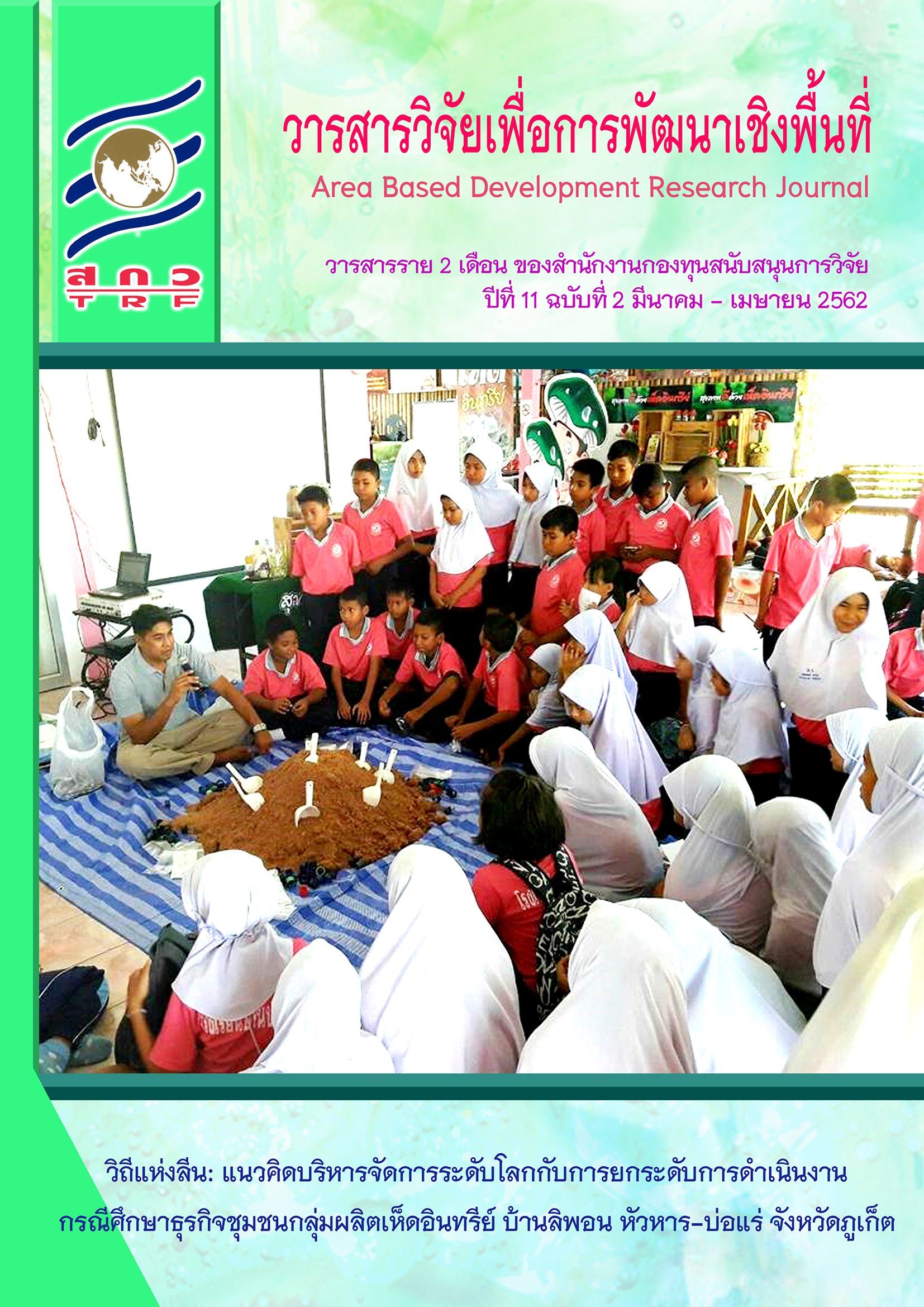The LEAN Way: Global Management Concepts Enhance the Operation Case Study of Organic Mushroom Community Business, Ban Liphon Hua Han – Bor Rae, Phuket Province
Main Article Content
Abstract
“Living a healthy life with organic mushrooms” is the slogan of the Community Enterprise, Moo 8, Sri Sunthon sub-district, Thalang district, Phuket province. The Community Enterprise has been formed under a major objective to generate extra income by growing and processing mushrooms.When the community’s business expands, however, the members face problems regarding overall operation and daily routines, resulting in members not achieving their preset goals. According to the findings from research carried out by the researcher and the members of the community, some problems demand for immediate solutions. To name but a few, problems may concern physical fatigue of community members after the long working hours at work leading to muscle pain and injury; hence low productivity. Another major problem deals with work space management in order to facilitate the work process and save time on looking for unorderly placed tools. In this regard, the researcher applied the participatory operation-based methodology in attempt to solve the problems. The LEAN concept and 5S (clearing up, organizing, cleaning, standardizing and training & discipline), which aim to transform waste to value through active working, are employed. The results are four folds. Firstly, a suitable and standardized 5S area for product processing is implemented in the community. Secondly, the adjusted process and working method improves efficiency of operation time-wise, particularly by using clippers to sort mushrooms. It reduces times and frequency of 2,000 mini mushroom cubes lifting from 88.37 hours to 35.36 hours. Thirdly, the newly introduced operation method in packing mushrooms in plastic bags can accommodate the workers and reduce physical fatigue. According to the Rapid Upper Limp Assessment (RULA), the risk value before improvement was 7, which was then reduced to 6. Also, the Rapid Entire Body Assessment (REBA) implies that the risk value before improvement was 8, but then dropped to 4. Fourthly, the community has developed LEAN Canvas business that helps the start-up business development. In conclusion, LEAN knowledge and understanding is crucial for practical application of scientific and social procedures to meet the goals of the Community to upgrade itself to ‘the important learning center of organic mushroom production’ in Thailand.
Article Details

This work is licensed under a Creative Commons Attribution-NonCommercial-NoDerivatives 4.0 International License.
Area Based Development Research Journal values copyright protection and licensing to safeguard author rights and facilitate the appropriate dissemination of research. Our policies ensure openness, accessibility, and attribution. Authors retain copyright ownership, and articles are published under a Creative Commons Attribution License (CC BY), allowing sharing, adaptation, and proper attribution. Authors have the freedom to publish under the CC BY license, granting broad reuse and distribution permissions. The journal supports posting articles on third-party repositories, adhering to institutional and funding restrictions. Author guidelines detail copyright and licensing requirements, empowering authors with knowledge about their rights and responsibilities. These policies cultivate an environment of collaboration, openness, and responsible sharing, benefiting authors and the research community while honoring intellectual property rights.
References
กาญจนา แก้วเทพ. (2559). บททดลองเสนอ: การเขียนบทความวิจัยเพื่อสังคม. วารสารวิจัยเพื่อการพัฒนาเชิงพื้นที่, 8(2), 100-121.
กิตติชัย อธิกุลรัตน์ และ ภัทรพงษ์ ภาคภูมิ. (2560). การประยุกต์ระบบการผลิตแบบลีนเพื่อเพิ่มประสิทธิภาพการผลิต กรณีศึกษา บริษัท ยู.พี.เอส.อุตสาหกรรม จำกัด. วารสารวิทยาศาสตร์และเทคโนโลยี มหาวิทยาลัยเกษตรศาสตร์, (6)3, 13-26.
ปฐมชัย พิชิตผจงกิจ. (2561). การปรับปรุงกระบวนการผลิตแชสซีส์ของโรงงานประกอบรถบรรทุก. วารสารวิศวกรรมศาสตร์ มหาวิทยาลัยเชียงใหม่, (25)2, 55-66.
ภีม พรประเสริฐ และ คณิศร ภูนิคม. (2558). การลดความสูญเปล่าในกระบวนการผลิตกระถาง กรณีศึกษา กลุ่มวิสาหกิจชุมชนในจังหวัดอุบลราชธานี. วารสารเทคโนโลยีอุตสาหกรรม มหาวิทยาลัยราชภัฏอุบลราชธานี, 3(6), 61-72.
วีรชัย มัฎฐารักษ์. (2561). การลดความสูญเสียในการทำงานของเกษตรกรชาวสวนยางพาราด้วยวิธีการประเมินผลทางการยศาสตร์: กรณีศึกษาในพื้นที่อำเภอมะนัง จังหวัดสตูล. วารสารวิชาการเทคโนโลยีอุตสาหกรรม, 14(1), 13-21.
สุชาดี ธำรงสุข, วันชัย แหลมหลักสกุล และ สมนึก วิสุทธิแพทย์. (2559). การลดความสูญเปล่าในกระบวนการผลิตของโรงงานผลิตเครื่องปรับอากาศ. วารสารวิชาการพระจอมเกล้าพระนครเหนือ, (26)3, 451-461.
อนิรุจน์ มะโนธรรม. (2560). การศึกษาแนวทางการปรับปรุงด้านการยศาสตร์ของพนักงานวาดเซรามิกในโครงการพระราชดำริฯ บ้านทุ่งจี้ อำเภอเมืองปาน จังหวัดลำ ปาง. วารสารวิชาการอุตสาหกรรมศึกษา, (11)1, 107-118.
Hignett, S. & McAtamney, L. (2000). REBA: Rapid entire body assessment. The Journal Applied Ergonomic, 31(2), 201-205.
McAtamney, L. & Corlett, E. N. (1993). RULA: A survey method for the investigation of work-related upper limb disorders. The Journal Applied Ergonomics, 24(2), 91-99.


